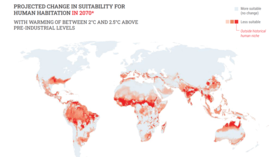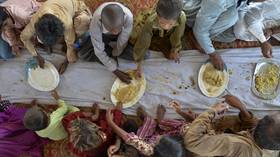Heatwaves could make entire regions uninhabitable – UN

Scorching heatwaves fueled by climate change could leave some areas of the world virtually uninhabitable over the coming decades, the United Nations said in a new report, warning that extreme weather could push poorer nations to the brink of disaster.
Published jointly by the Red Cross and the UN's Office for the Coordination of Humanitarian Affairs (OCHA) on Monday, the document points to intensifying heatwaves around the world, saying they are growing at an “alarming rate” and already “fueling catastrophes” in some countries.
“On current trajectories, heatwaves could meet and exceed… physiological and social limits in the coming decades, including in regions such as the Sahel, and South and South-West Asia,” the report said, saying some areas risk becoming “practically uninhabitable.”
The impacts would include large-scale suffering and loss of life, population movements and further entrenched inequality. These impacts are already emerging.
Highly populated cities are among the most vulnerable areas, with the UN citing a projected 700% increase in the number of urban poor people living in “extreme heat conditions” by the 2050s.
“Projected future death rates from extreme heat are staggeringly high – comparable in magnitude by the end of the century to all cancers or all infectious diseases – and staggeringly unequal,” the report said, explaining that the world’s poorest will bear the worst effects of the changing climate.
Rising temperatures and more frequent heatwaves are also expected to “undermine agriculture and livestock systems, degrade natural resources, damage infrastructure and contribute to migration,” the report found, noting that economic losses related to “heat stress” will exceed $2.4 trillion worldwide by 2030.
Past heatwaves have had deadly consequences, estimated to have caused more than 70,000 excess deaths in Europe in 2003, and another 55,000 in Russia in 2010, according to statistics cited by the UN.
The report said “aggressive steps” were needed to avoid the worst outcomes, insisting that the “single most important arena for action is in slowing and stopping climate change.” Short of that, however, it suggested providing “early information on heatwaves” to help people “take timely action” to protect themselves, adapt new responses to “accelerating extreme heat” and investments into “thermally appropriate emergency housing,” among other things.













